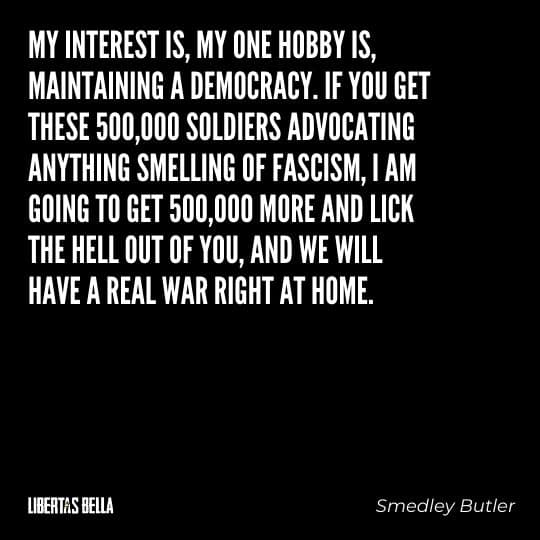

Now that I see the international war clouds gathering, as they are today, I must face it and speak out.”īutler went on to describe who bears the costs of war - the men who die or return home with wrecked lives, and the taxpayers - and who profits - the companies that sell goods and services to the military. He followed this by noting, “For a great many years, as a soldier, I had a suspicion that war was a racket not until I retired to civil life did I fully realize it. It is the only one in which the profits are reckoned in dollars and the losses in lives. It is the only one international in scope. It is possibly the oldest, easily the most profitable, surely the most vicious. That same year he published a short book with the now-famous title War Is a Racket, for which he is best-known today. The best he could do was to operate his racket in three districts. Looking back on it, I might have given Al Capone a few hints. In China in 1927 I helped see to it that Standard Oil went on its way unmolested. I helped make Honduras right for the American fruit companies in 1903. I brought light to the Dominican Republic for the American sugar interests in 1916. I helped purify Nicaragua for the International Banking House of Brown Brothers in 1902-1912. I helped in the raping of half a dozen Central American republics for the benefit of Wall Street. I helped make Haiti and Cuba a decent place for the National City Bank boys to collect revenues in. I helped make Mexico and especially Tampico safe for American oil interests in 1914. In short, I was a racketeer, a gangster for capitalism. I spent 33 years and four months in active military service and during that period I spent most of my time as a high class muscle man for Big Business, for Wall Street and the bankers. In light of this record Butler presumably shocked a good many people when in 1935 - as a second world war was looming - he wrote in the magazine Common Sense, During his years in the Corps he was sent to the Philippines (at the time of the uprising against the American occupation), China, France (during World War I), Mexico, Central America, and Haiti. By the time he retired he had achieved what was then the Corps’s highest rank, major general, and by the time he died in 1940, at 58, he had more decorations, including two medals of honor, than any other Marine. From 1898 to 1931, Smedley Darlington Butler was a member of the U.S.


 0 kommentar(er)
0 kommentar(er)
